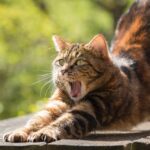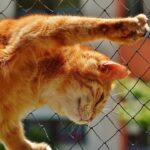Constipation in cats is more than just an occasional discomfort; it can lead to serious health issues if not addressed promptly. While veterinary care is crucial in severe cases, many instances of cat constipation can be managed effectively with dietary adjustments. This article will delve into how diet can help treat cat constipation, the nutritional needs of feline friends, and specific dietary strategies you can implement.
Understanding Cat Constipation
What is Constipation?
Constipation in cats is defined as infrequent or difficult bowel movements. A cat is considered constipated if it hasn’t defecated for more than 24-48 hours. Signs to watch for include straining to defecate, dry or hard stools, and abdominal discomfort.
Causes of Constipation in Cats
- Dehydration: Not drinking enough water can lead to hard stools.
- Poor Diet: Low fiber content in the diet can impede digestion.
- Lack of Exercise: Sedentary lifestyles can affect gastrointestinal motility.
- Medical Conditions: Underlying health issues like hip dysplasia or kidney disease may contribute.
Signs and Symptoms of Constipation
- Infrequent bowel movements
- Straining or crying while trying to defecate
- Abdominal tenderness
- Loss of appetite
- Vomiting
The Role of Diet in Managing Cat Constipation
Diet plays a crucial role in maintaining digestive health in felines. A balanced diet that includes adequate water and fiber can help promote regular bowel movements. Here’s how to tailor your cat’s diet to alleviate constipation:
1. Hydration: The Foundation of Digestive Health
Why Hydration Matters
Water is essential for every biological function, including digestion. Cats are naturally low-water drinkers; hence, their diets must compensate for unsatisfactory water intake.
Strategies to Keep Your Cat Hydrated
- Wet Food vs. Dry Food: Incorporate wet (canned) food into your cat’s diet. This not only provides hydration but also generally contains more protein and fat than dry food.
- Fresh Water: Ensure your cat has access to clean, fresh water at all times. Consider using a fountain, as many cats prefer running water.
- Broth and Soups: Offering low-sodium chicken or beef broth can increase fluid intake without introducing too many calories.
2. Increasing Fiber Intake
The Importance of Fiber
Fiber adds bulk to stool and helps it move smoothly through the digestive tract. There are two types of fiber: soluble and insoluble.
Sources of Fiber for Cats
- Pumpkin: Canned pumpkin (not the spiced pie filling) is rich in soluble fiber and can help improve stool consistency.
- Psyllium Husk: This natural fiber supplement can also be mixed into your cat’s food.
- Vegetables: Carrots, peas, and sweet potatoes can be pureed or finely chopped and added to your cat’s diet.
- Commercial High-Fiber Cat Foods: Some brands formulate their food with higher fiber to assist with constipation.
3. Adjusting Protein and Fat Levels
Balancing Nutrients
While protein is essential, too much can lead to dehydration, especially in dry food. Fat plays a role in maintaining gut health, aiding in the absorption of fat-soluble vitamins.
Optimal Ratios for Cats
- Prioritize high-quality protein from sources like chicken, turkey, and fish.
- Moderate fat levels help maintain energy without leading to obesity, which can worsen constipation.
4. Using Probiotics
Gut Health
Probiotics contribute significantly to maintaining a healthy gut flora, which in turn aids digestion.
Sources of Probiotics
- Probiotic Supplements: Consult your vet for recommendations on feline-specific probiotics.
- Fermented Foods: Some pet owners incorporate small amounts of plain yogurt, but you should check with your vet as not all cats can digest dairy.
5. Avoiding Constipation Triggers
Certain foods can exacerbate a cat’s constipation. Here are some key items to avoid:
- Low-Quality Dry Kibble: Many commercial dry cat foods have low fiber content; some even dehydrate cats.
- Dairy Products: While cats often love dairy, many are lactose intolerant, leading to digestive upset.
- Certain Grains: Corn and wheat may cause digestive issues. Opt for grain-free formulas where applicable.
Sample Diet Plan to Treat Cat Constipation
Day 1: High-Fiber Introduction
Breakfast
- 1/4 cup canned pumpkin mixed with 1/2 cup quality wet cat food.
Lunch
- Small serving of low-sodium chicken broth.
Dinner
- 1/2 cup wet cat food mixed with a teaspoon of psyllium husk.
Day 2: Continued Fiber Focus
Breakfast
- 1/4 cup wet cat food with a tablespoon of pureed sweet potato.
Lunch
- Fresh water and a few green peas for texture.
Dinner
- 1/2 cup wet cat food + 1/4 cup canned pumpkin.
Day 3: Introduce Probiotics
Breakfast
- 1/2 cup wet cat food + recommended dose of probiotics.
Lunch
- Low-sodium broth with a sprinkle of pureed carrots.
Dinner
- 1/2 cup wet food + 1 teaspoon of psyllium husk.
Following Days: Monitor and Adjust
Continue monitoring your cat’s bowel movements. If there’s no improvement within a few days, consult your veterinarian.
Monitoring Your Cat’s Progress
Keep a log of your cat’s behavior and bowel movements. Look for signs of:
- Improved frequency and consistency of stools
- Less straining or discomfort
- Continued hydration levels (soft, hydrated stool)
When to Consult Your Veterinarian
If you notice persistent constipation or any signs of distress, such as vomiting, lethargy, or refusal to eat, it’s time to consult a veterinarian. They can provide additional treatment options, medication, or tests to rule out any underlying conditions.
Conclusion
Cat constipation can be effectively managed through dietary changes. By focusing on hydration, increasing fiber intake, and ensuring a balanced nutrient profile, you can help your feline friend maintain regular and healthy bowel movements. Always consult your veterinarian before making significant changes to your cat’s diet, especially if your cat has underlying health concerns.
FAQs
Q: Can I use human food to treat my cat’s constipation?
A: Yes, but ensure it’s safe for cats. Foods like plain pumpkin or sweet potatoes are good, whereas many human foods can be toxic to cats.
Q: How much pumpkin should I give my cat?
A: Start with a teaspoon mixed into their food and observe any changes before increasing the amount.
Q: Are there any special diets for constipated cats?
A: Yes, some brands specialize in high-fiber or veterinary diets. Consult your vet for specific recommendations.
Q: Can dehydration cause anemia?
A: Chronic dehydration can lead to various health issues, including anemia. If your cat is dehydrated, consult your vet immediately.
By following these guidelines and staying attentive to your cat’s diet and overall health, you can help manage and prevent constipation, ensuring your furry friend remains happy and healthy.
Featured Image Credit: Pixabay


